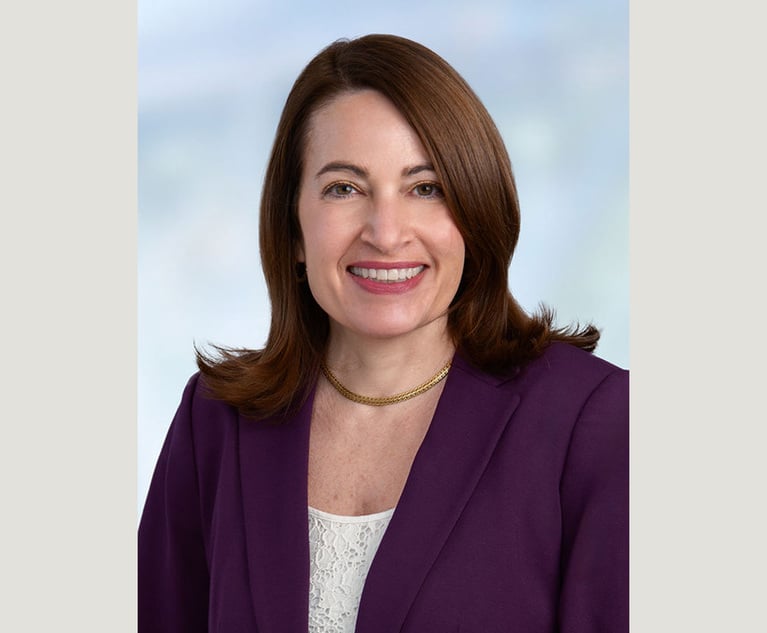Growing a Practice Without Walls: Real Life in a Virtual Law Firm
"It's kind of a hybrid between being a law firm and an independent businessman," Philadelphia IP lawyer Stephen Weed said.
July 23, 2019 at 05:53 PM
7 minute read
 Benjamin Franklin bridge in Philadelphia. (Photo: Shutterstock)
Benjamin Franklin bridge in Philadelphia. (Photo: Shutterstock)
Lower overhead costs. More rate flexibility. Better work-life balance, and possibly greater gender parity. The perks of working at a virtual law firm, as boasted by the lawyers that work for them, are enviable.
Several of these firms have moved into Philadelphia, even if—as the name suggests—they didn't set up brick-and-mortar offices.
The firms don't all appreciate the “virtual” descriptor.
“That sounds like it's not real,” said Eric Meyer, a partner at FisherBroyles. Instead, his firm uses the term “distributed” to describe its partnership. It's not just a collection of 240 solo practitioners, he clarified.
“Think of it as a distributed model where we're all at satellite offices of the same law firm,” he explained.
Meyer, who joined FisherBroyles in March 2018, was a partner at Philadelphia-based regional firm Dilworth Paxson before that. The biggest difference in his day-to-day work is an obvious one.
“One thing we certainly don't have in a cloud-based distributed model like FisherBroyles is as much face-to-face contact as you'd have in a traditional law firm,” Meyer said. However, he noted, working remotely is not the only feature that separates FisherBroyles from more traditional firms.
Not having brick-and-mortar offices means significant savings, which goes toward making rates affordable for clients and allows for a simple compensation system. That's aided further by the fact that FisherBroyles has only partners, no associates.
“Because we don't have the same overhead we have more rate flexibility,” Meyer said. “The one place where we don't skimp at all is technology. We punch at the highest weight there.”
Philadelphia IP lawyer Stephen Weed left local boutique RatnerPrestia earlier this year to join Culhane Meadows, which was founded by a group of former FisherBroyles partners. Like the firm it spun off from, Culhane Meadows has no associates and no physical office space.
Weed had long practiced at more traditional IP firms. But his clients weren't turned off by the move, he said.
“They loved the fact that I actually did reduce my rate a bit, by about 10%,” Weed said.
Of course, that came with some other changes. Now, his paralegal is in Dallas instead of down the hall, he said. Most communication is via email, instead of passing a physical file folder back and forth.
The lack of face-to-face interaction has a minimal effect on actual legal work, he said, because “I find that I'm in my own head a lot.” And he rarely met with clients in his own office before joining Culhane Meadows, so that finding space for client meetings wasn't an issue.
Some business functions, like travel arrangements for instance, are not handled on a firmwide basis like they are at many long-established firms, Weed noted. While it's taken some adjusting, that allows individual partners to have more control over their costs, he said.
“It's kind of a hybrid between being a law firm and an independent businessman,” Weed said. “We're cutting down a lot of the fat.”
Another firm with a distributed model, Rimon, actually has some physical office space.
“We don't have any dogmatic opposition to real estate like some purely virtual firms. If the needs of our lawyers or clients dictates that we have an office, we get an office,” said Yaacov Silberman, a founding partner of Rimon. Still, at least half of the firm's workforce works from home, he said, and so far none, to his knowledge, have tired of the setup.
“From a profitability standpoint you're spending less money on real estate. That is a very direct and measurable effect,” he said. “I don't know anyone who came in wanting an office, tried not having one, and then went back to having an office.”
Often it's other aspects of the business model that attract lawyers to Rimon, Silberman said. “We get a lot of people coming to the firm because they're frustrated about not being able to do the things they need to do,” like lowering rates or taking on clients that would be conflicted out at their prior firm.
At Rimon, he said, they find less bureaucracy, more flexibility and “deference to the relationship partners” for managing to client needs.
Connecting in the Cloud
However, Silberman noted, having so many people working remotely means the firm's lawyers must be “more deliberate” about creating and maintaining a positive culture, and making opportunities for people to get to know one another for more than just the work they do.
Rimon has done that in part by implementing a matching program, which sets up short meetings between lawyers who are in different geographic or practice areas, for the sole purpose of getting them acquainted. The firm also has three in-person retreats each year, Silberman said.
“I have heard people who came from traditional law firms say that they know their partners better here,” he said.
Weed said Culhane Meadows has monthly firmwide and practice group meetings that are held by conference call, as well as monthly region meetings that are held in person at the co-working space of one of the partners or at a restaurant if the agenda is less formal. Because the firm has just two Philadelphia lawyers, he attends the regional meetings in New York. But the Philadelphia office will likely grow soon and have its own meetings.
The degree of support Weed gets from other partners has been a pleasant surprise, he said. They're quick to respond to technical questions and to pitch in when he needs help in areas where he would have called on associates at his prior firm.
Still, there's one area where Culhane Meadows, as well as FisherBroyles, cannot dedicate resources, because of their respective business models: training young lawyers. At both firms, incoming lateral hires must be experienced enough to enter at the partner level.
Despite that major difference from most established law firms, Meyer argued that his firm's model is scaleable. And more traditional firms may have to adopt it, because as rates continue to creep up, “at some point the client's going to tap out,” Meyer suggested.
“You've got to find a way to provide value to the client,” he said. “We have found an awesome way to provide it.”
Weed said traditional law firms could probably pivot in the direction of distributed and cloud-based firms, but “the more you have, the more difficult it is.” They would benefit most from leveraging technology like the newer upstarts do, including going paperless and allowing people to work from home.
Rimon, on the other hand, does have associate ranks. Silberman said the firm has been able to grow and scale in part because its partners do not operate in a bureaucratic system, and employees also have a voice.
Silberman said he's hesitant to give advice to traditional firms from the viewpoint of a distributed partnership. But if he found himself at the helm of a longstanding firm, he would make sure to question how everything is done on a regular basis. At Rimon, this is done by asking new attorneys and staff members to be candid in their suggestions and criticisms for the firm, he said.
“In large institutions there's all this institutional inertia that builds up,” Silberman said. “It's really good to always try to get an outside perspective on what you're doing and why you're doing that, and question it all the time.”
He said he's hopeful that Rimon will stay open to change as it grows, because so many of its partners have come from Big Law and understand what that inertia looks like.
“It's easier to be nimble as a smaller or midsize organization,” he said. But staying innovative “just requires constant vigilance and making sure we're always thinking about why we're doing what we're doing, and what we care about.”
Read More
This content has been archived. It is available through our partners, LexisNexis® and Bloomberg Law.
To view this content, please continue to their sites.
Not a Lexis Subscriber?
Subscribe Now
Not a Bloomberg Law Subscriber?
Subscribe Now
NOT FOR REPRINT
© 2025 ALM Global, LLC, All Rights Reserved. Request academic re-use from www.copyright.com. All other uses, submit a request to [email protected]. For more information visit Asset & Logo Licensing.
You Might Like
View All
Superior Court Directs Western Pa. Judge to Recuse From Case Over Business Ties to Defendant
3 minute read

Neighboring States Have Either Passed or Proposed Climate Superfund Laws—Is Pennsylvania Next?
7 minute readTrending Stories
Who Got The Work
J. Brugh Lower of Gibbons has entered an appearance for industrial equipment supplier Devco Corporation in a pending trademark infringement lawsuit. The suit, accusing the defendant of selling knock-off Graco products, was filed Dec. 18 in New Jersey District Court by Rivkin Radler on behalf of Graco Inc. and Graco Minnesota. The case, assigned to U.S. District Judge Zahid N. Quraishi, is 3:24-cv-11294, Graco Inc. et al v. Devco Corporation.
Who Got The Work
Rebecca Maller-Stein and Kent A. Yalowitz of Arnold & Porter Kaye Scholer have entered their appearances for Hanaco Venture Capital and its executives, Lior Prosor and David Frankel, in a pending securities lawsuit. The action, filed on Dec. 24 in New York Southern District Court by Zell, Aron & Co. on behalf of Goldeneye Advisors, accuses the defendants of negligently and fraudulently managing the plaintiff's $1 million investment. The case, assigned to U.S. District Judge Vernon S. Broderick, is 1:24-cv-09918, Goldeneye Advisors, LLC v. Hanaco Venture Capital, Ltd. et al.
Who Got The Work
Attorneys from A&O Shearman has stepped in as defense counsel for Toronto-Dominion Bank and other defendants in a pending securities class action. The suit, filed Dec. 11 in New York Southern District Court by Bleichmar Fonti & Auld, accuses the defendants of concealing the bank's 'pervasive' deficiencies in regards to its compliance with the Bank Secrecy Act and the quality of its anti-money laundering controls. The case, assigned to U.S. District Judge Arun Subramanian, is 1:24-cv-09445, Gonzalez v. The Toronto-Dominion Bank et al.
Who Got The Work
Crown Castle International, a Pennsylvania company providing shared communications infrastructure, has turned to Luke D. Wolf of Gordon Rees Scully Mansukhani to fend off a pending breach-of-contract lawsuit. The court action, filed Nov. 25 in Michigan Eastern District Court by Hooper Hathaway PC on behalf of The Town Residences LLC, accuses Crown Castle of failing to transfer approximately $30,000 in utility payments from T-Mobile in breach of a roof-top lease and assignment agreement. The case, assigned to U.S. District Judge Susan K. Declercq, is 2:24-cv-13131, The Town Residences LLC v. T-Mobile US, Inc. et al.
Who Got The Work
Wilfred P. Coronato and Daniel M. Schwartz of McCarter & English have stepped in as defense counsel to Electrolux Home Products Inc. in a pending product liability lawsuit. The court action, filed Nov. 26 in New York Eastern District Court by Poulos Lopiccolo PC and Nagel Rice LLP on behalf of David Stern, alleges that the defendant's refrigerators’ drawers and shelving repeatedly break and fall apart within months after purchase. The case, assigned to U.S. District Judge Joan M. Azrack, is 2:24-cv-08204, Stern v. Electrolux Home Products, Inc.
Featured Firms
Law Offices of Gary Martin Hays & Associates, P.C.
(470) 294-1674
Law Offices of Mark E. Salomone
(857) 444-6468
Smith & Hassler
(713) 739-1250






